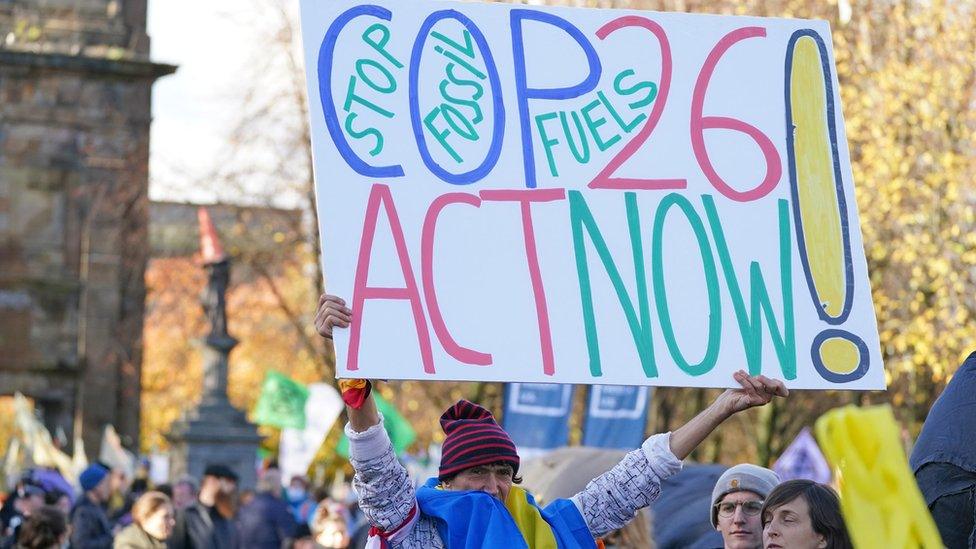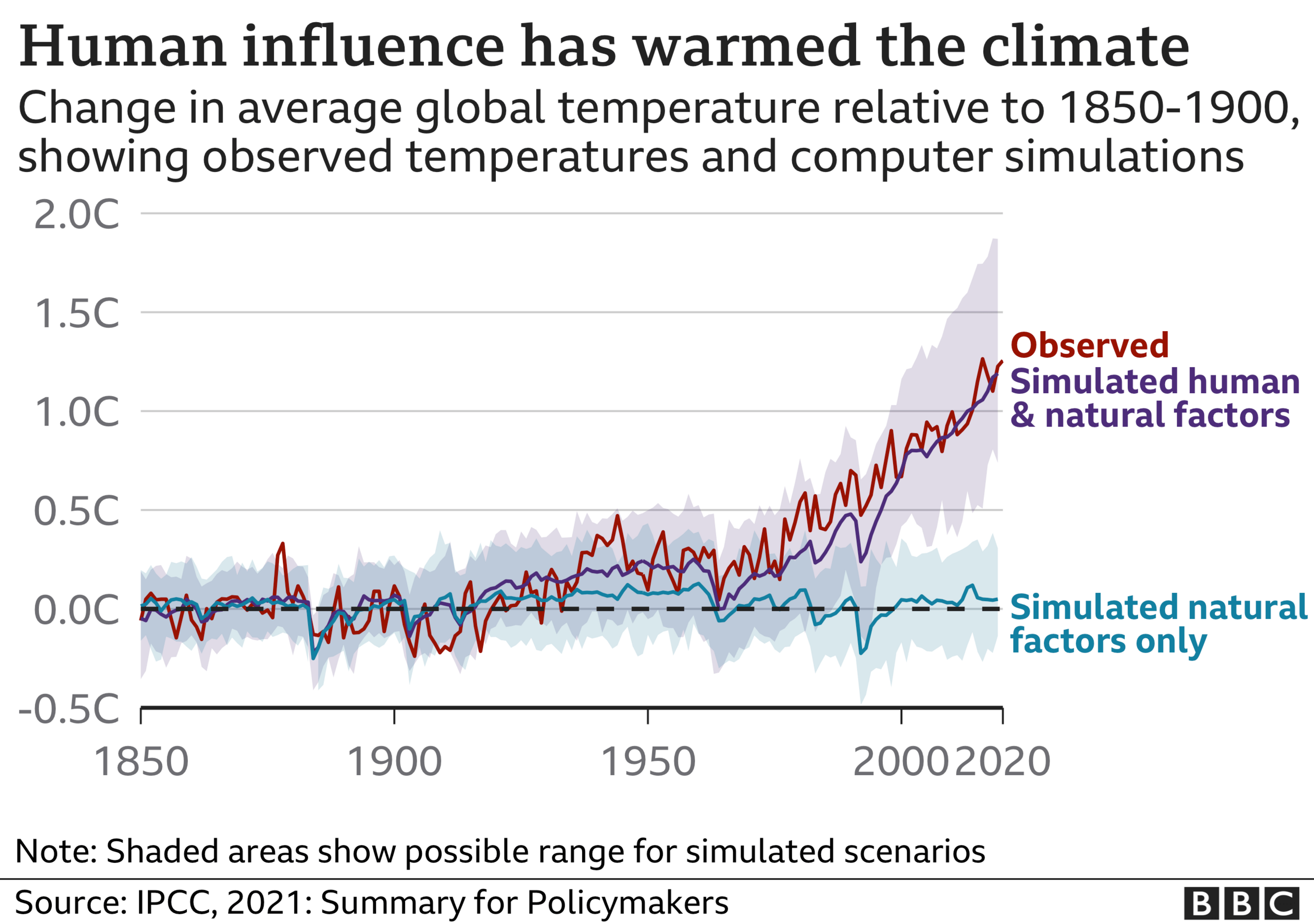COP26: 'Window closing' to meet 1.5C warming target - Alok Sharma
- Published

Alok Sharma was addressing COP26 in Glasgow on Sunday morning
The window to keep within the 1.5 degree warming target is closing, COP26 president Alok Sharma has warned the climate summit in Glasgow.
Scientists say that keeping global warming below 1.5C - a target world leaders agreed to work towards in 2015 - will avoid the worst climate impacts.
"We know our shared planet is changing for the worse, and we can only address that together," said Mr Sharma.
Sunday is day one of COP26, which was postponed from 2020.
In his opening speech at the summit, Mr Sharma said: "During that year climate change did not take time off."
A report by the World Meteorological Organisation, launched to coincide with the start of COP26 , said that extreme weather events - including powerful heat waves and devastating floods - are the new normal.
Mr Sharma said: "We need to hit the ground running to develop the solutions that we need. And that work starts today - and we succeed or fail as one."
The Conservative MP added that COP26 was "our last best hope" to meet the aim originally set by world leaders in Paris six years ago.
"Where Paris promised, Glasgow delivers," he said.
Mr Sharma, who was appointed to the role of COP26 president on 8 January, said the "rapidly changing climate is sounding an alarm to the world".
"I believe we can move negotiations forward and launch a decade of ever increasing ambition and action."
He earlier told BBC One's Andrew Marr Show that "this is on leaders" and they needed "to come forward".
Prime Minister Boris Johnson told the BBC that climate change was "the biggest threat to humanity", saying it posed a "risk to civilisation basically going backwards".

Can COP26 really save the planet?

At face value, things do not look promising, for a simple reason: the previous 25 of these giant conferences failed to turn off the tap of the greenhouse gases that are driving up global temperatures.
Despite three decades of talking, the planet is now at least 1.1C hotter than the pre-industrial level - and rising.
For this conference, however, expectations for real progress are higher than usual.
That's partly because the risks are hitting home. This year floods killed 200 people in Germany, heatwaves struck chilly Canada and even the Siberian Arctic was burning.
And scientists are clearer than ever that avoiding the most damaging temperatures means halving global carbon emissions by 2030 - a deadline looming close enough to focus minds.

The two-week COP26 summit, which ends on 12 November, will see delegates from around 200 countries discuss how to cut emissions by 2030.
More than 25,000 people are expected to descend on the city for the event, including international delegates and protestors.
Swedish climate activist Greta Thunberg is currently in Glasgow but told BBC One's Andrew Marr that she had not been "officially" invited to speak at COP26.

COP26 climate summit - The basics
Climate change is one of the world's most pressing problems. Governments must promise more ambitious cuts in warming gases if we are to prevent greater global temperature rises.
The summit in Glasgow is where change could happen. You need to watch for the promises made by the world's biggest polluters, like the US and China, and whether poorer countries are getting the support they need.
All our lives will change. Decisions made here could impact our jobs, how we heat our homes, what we eat and how we travel.

Asked whether she believed an agreement would be reached to keep global warming below 1.5C, she said she thought it was "possible in theory".
"We know that change is possible, because we can look back in history and see that there have been massive changes in society that have been unprecedented," Ms Thunberg said.
"If we felt like there wasn't any hope, we wouldn't be activists."

An authentic Glasgow welcome
By Debbie Jackson, BBC Scotland reporter, at the scene
COP26 delegates are greeted with an authentic Glasgow welcome - it's a gloomy Sunday and the rain is pouring down.
Traffic in the city centre is made up of electric buses, brought in to service the conference, and police vans from across the UK.
Climate campaigners make their way along the river with damp flags, and the COP26 volunteers try to remain cheery in their sodden bobble hats.
Blue-lanyarded delegates are being dropped off at the squinty bridge to walk to the venue.
I bump into delegates from Gabon who arrived less than 24 hours ago. They've just had breakfast in a local café and are ready to make their case.
Ghislain Moussavou, director general of the government's forestry commission, is here with a private contractor, Hadi Ghossein.
Mr Moussavou says: "We are here to speak up for Africa. We are doing a lot to combat the effects of climate change and we bear a lot of its impact."

As COP26 begins, key political leaders have ended the G20 summit in Rome setting an ambition to reach carbon neutrality "by or around mid-century".
In a draft of their final communique, seen by the BBC, they have agreed to pursue efforts to limit global warming to 1.5C.
That goes further than the Paris agreement, in which much of the world agreed to keep global warming "well below" 2C.
The G20 is a global forum where 19 countries and the European Union discuss major issues.
China's Xi Jinping and Russia's Vladimir Putin have chosen not to attend in person - instead appearing via video link.
During the event, Prince Charles has urged governments to work with the private sector in a bid to make progress "for the sake of humanity".


The COP26 global climate summit in Glasgow in November is seen as crucial if climate change is to be brought under control. Almost 200 countries are being asked for their plans to cut emissions, and it could lead to major changes to our everyday lives.
